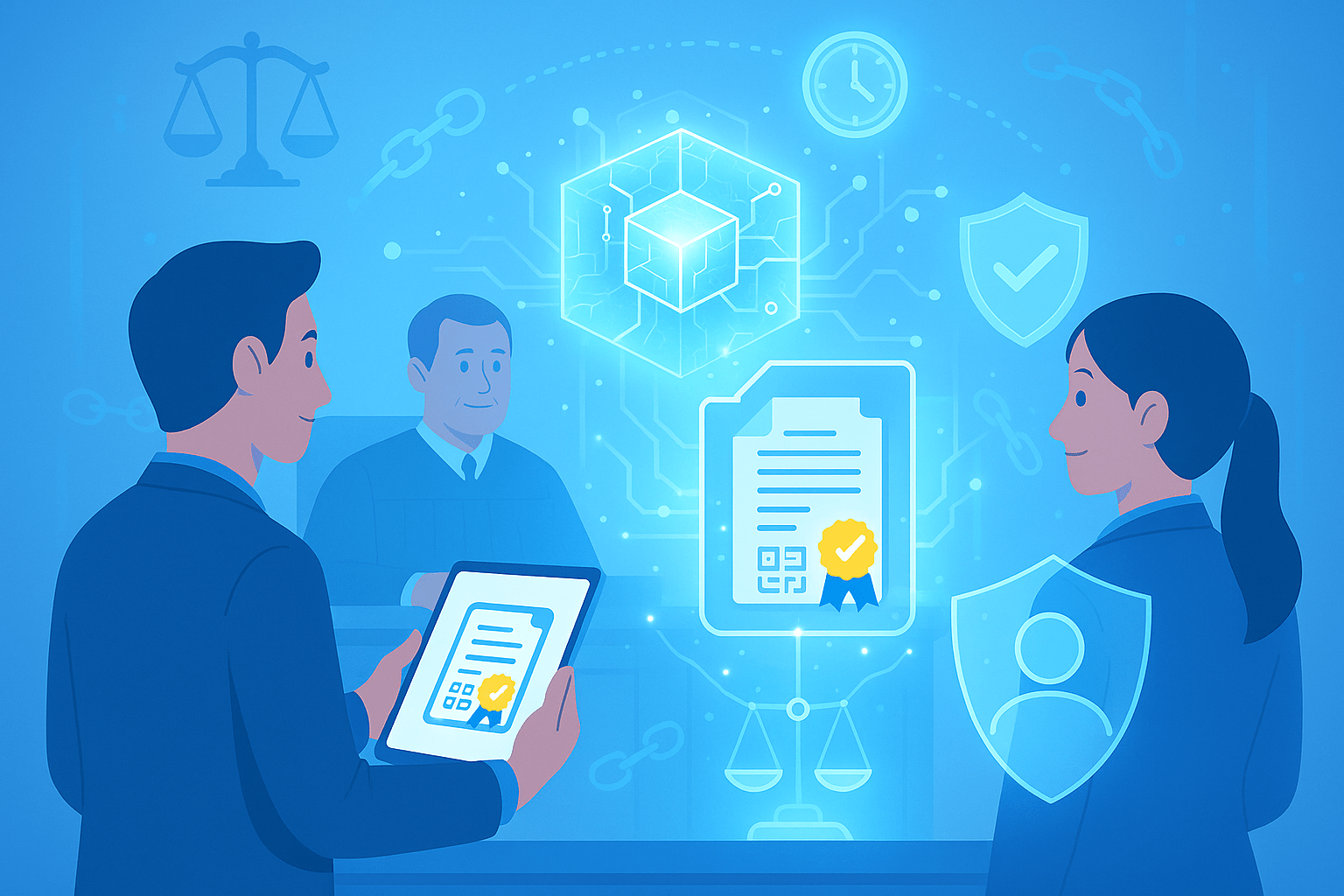How Lawyers and Legal Teams Use CZone
CZone byLutinX has quickly become a trusted legal support tool for professionals handling intellectual property and digital documentation.

Blockchain certificates are more than proof of ownership — they are legally admissible evidence that can protect your rights in disputes, arbitration, and court proceedings.
In many legal disputes — from copyright infringement and contract violations to data integrity and authorship claims — time and authenticity are everything.
Courts and arbitration panels often base their decisions on who created, signed, or shared something first and whether that document remained unaltered.
CZone provides a reliable chain of evidence, ensuring:
The exact date and time when a work or file was created.
The identity of the creator or owner (via KYC/KYB).
The immutability of the record, proven by blockchain.
This combination transforms each certificate into a powerful piece of legal evidence that is verifiable, transparent, and globally recognized.
Across most jurisdictions, courts already recognize electronic documents and digital signatures as admissible evidence.
With the rise of blockchain technology, this principle has extended to blockchain-registered certificates.
Authenticity: Each file is uniquely identified by its hash (digital fingerprint).
Integrity: Once registered, the record cannot be modified or deleted.
Reliability: Blockchain ensures that the registration process is transparent and traceable.
EU eIDAS Regulation (2016): gives full legal effect to electronic timestamps and digital signatures.
US Federal and State Laws: such as the E-SIGN Act and state-level blockchain evidence laws (e.g., Vermont, Delaware).
China: Internet Courts have officially accepted blockchain-based evidence since 2018.
Africa: countries like South Africa, Etiopia and Nigeria recognize blockchain-stamped data as admissible electronic evidence under their digital communications and transactions acts.
When presenting blockchain evidence, clarity and traceability are key.
Locate the registered file related to the dispute.
Each CZone certificate includes:
Timestamp and file hash.
Blockchain transaction ID.
Author/owner data (if verified).
QR code for public verification.
Include it in your court filing, arbitration dossier, or legal documentation.
A simple hash verification or blockchain record lookup may be sufficient. In complex cases, a technical affidavit or expert witness can further validate the process.
CZone byLutinX has quickly become a trusted legal support tool for professionals handling intellectual property and digital documentation.
By combining blockchain immutability with identity verification, CZone simplifies the evidentiary process while reducing costs and administrative complexity.
Prove the priority of creation with immutable blockchain evidence.
Establish early proof of concept, invention, or technical drawings.
Confirm signing dates and prevent backdating or document alteration.
Demonstrate the integrity of original files using their hash and timestamp.
Verify the originality of papers, theses, and research work.
In all these cases, a CZone certificate acts as a neutral digital witness — a record that cannot be erased, altered, or forged.
The global legal community increasingly recognizes blockchain evidence as trustworthy and admissible:
EU: electronic timestamps and digital records are fully recognized under eIDAS.
US: state and federal courts have accepted blockchain as valid proof in civil and IP disputes.
China: blockchain-stamped evidence has been successfully used in Internet Courts for copyright infringement cases.
Africa: courts in South Africa, Nigeria, and Kenya have started referencing blockchain-based digital evidence in commercial and IP-related disputes.
This growing recognition shows that blockchain proof has moved from theory to practical acceptance in judicial systems worldwide.
Legal systems around the world are evolving — and blockchain is now part of that evolution.
CZone certificates transform digital assets into verifiable, admissible legal evidence, offering creators, companies, and professionals the power to protect their rights with certainty and trust.
Whether you’re defending authorship, enforcing a contract, or resolving a dispute, CZone provides the proof, transparency, and legal weight your case needs.
👉 Use your CZone certificates confidently — your evidence is already secured, immutable, and ready for any courtroom.
Find quick answers to the most common questions.
Yes. While legal systems differ, blockchain certificates are accepted in courts and arbitration in many jurisdictions, including the EU, US, China, and Africa.
In most cases, no. A CZone certificate can serve as self-authenticating proof of existence and authorship. However, for certain formal acts, traditional notarization may still be required.
The identity of the creator or owner is verified via KYC/KYB and securely linked to the blockchain record.
Any evidence can be challenged, but due to blockchain immutability, falsifying or altering a CZone record is virtually impossible.
Lawyers can scan the QR code on the PDF certificate or verify the transaction hash directly on the LutinX blockchain explorer.
Not always. Most courts accept blockchain evidence as self-verifying, but an expert report can help clarify the technical process in complex cases.
Absolutely. Many organizations use CZone to timestamp employee contracts, policies, and creative projects for full traceability and accountability.